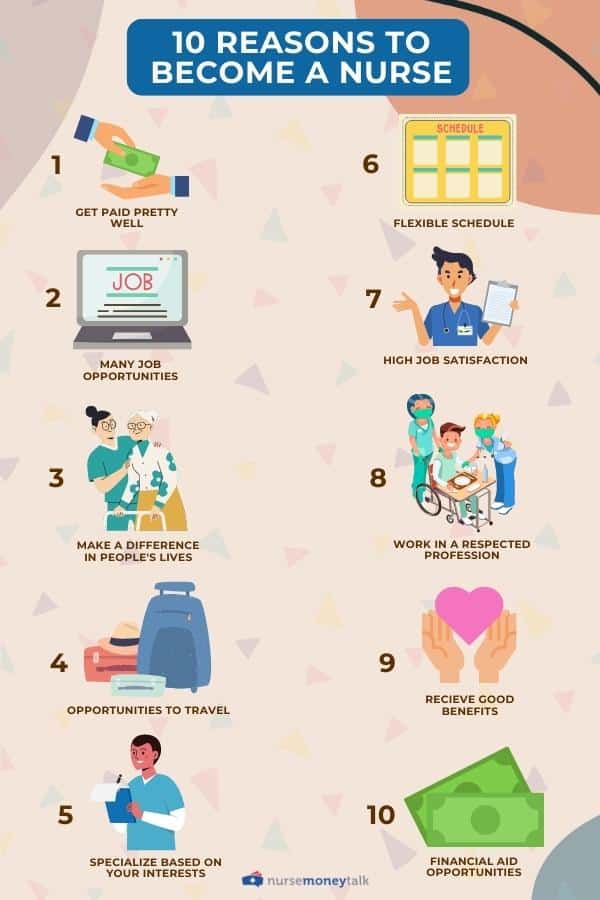Nobody enters the nursing profession on a whim.
It’s a well-thought-out, conscious decision to start a career that demands everything from you and returns plenty of rewards.
Reasons You Should Become a Nurse
Nursing is the only career that marries the science of medical knowledge with the art of caring for other human beings. It’s challenging, demanding, and respected for so many reasons. It also pays pretty well when compared to other professions.
Below I’ll go deeper into the reasons you should become a nurse.
If you do decide you want to become a nurse, go here to search for nursing schools.

1. Nurses Get Paid Pretty Well

Nursing pay varies by specialty, state, education level, and experience. But if you work out the average salary, it comes to about $75000 per year or $35 per hour.
So, not bad overall.
Bear in mind that some nurses will earn more than the average amount, and some will earn less.
2. Many Job Opportunities

The United States is experiencing a severe shortage of nurses, so finding a job is much easier now than ever before.
According to statistics from the American Association of Colleges of Nursing, 94% of BSN and 92% of MSN graduates find employment within six months after graduating.
What does this mean?
It means that once you graduate, you are almost guaranteed to find employment. However, you still need to put effort into job hunting after graduation.
3. You Get to Make a Difference in People’s Lives

Being able to help others in a meaningful way is good for the soul. It’s the most rewarding aspect of nursing.
As a nurse, you’ll have so many opportunities to admit a sick patient (at times on the verge of death) and over time see that patient get better.
The difference you can make in the lives of others (patients and their family members) is a feeling few professions can match.
4. You’ll Have Opportunities to Travel

If you want to travel the world but need an income to fund your travels, become a nurse.
As a licensed nurse in the U.S., you can apply to work in other countries in Europe, Australia, or the Middle East. International nursing positions can typically be found through agencies.
With an MSN degree, you can join organizations like Doctors Without Borders to be part of their health initiatives worldwide.
You will experience traveling and working in areas desperate for health care personnel. These are often life-changing experiences.
5. You Can Specialize Based on Your Interests

If you have a specific interest or strong affinity for a specific area of nursing, you will be able to follow your passion and specialize in that subspecialty.
For instance, you can become a Dialysis Nurse, Case Management Nurse, Nurse Educator, and more. You can also choose a specialty that allows you to work with specific patient populations, like neonatology nurses, midwives, or school nurses.
Some of these specialist areas may require further study, but the reward of working in a field you like is worth it.
6. Can Have a Flexible Schedule

Nursing can be as flexible as you want it to be, especially when trying to be there for your family while building a meaningful career.
If you work as a clinical bedside nurse in a hospital, you may need to work shifts and long hours. But there are also other more flexible options available.
You can work in places other than hospitals, like doctor‘s offices and schools, that provide a stable schedule. You can even work from home if you like, as a nurse writer or provide an online nursing service.
7. You’ll Have High Job Satisfaction

The public has high regard for nursing as a profession, and it is expected that nurses have very high job satisfaction, according to public opinion.
But are the nurses themselves satisfied with their jobs?
Job satisfaction is determined by comparing a person’s expectations with the reality of what the job entails.
Unfortunately, with the recent pandemic, nurses have started voicing their dissatisfaction with their working conditions and lack of good leadership, prompting many nurses to quit their positions working in hospitals. Or just retire.
8. You’ll Work in a Respected Profession

The public respects nurses as a whole. It’s an undeniable fact that nursing has been voted the most trusted profession for many years.
Nurses spend more time with patients in a hospital setting than any other healthcare professional.
They also form an important link between patients and their doctors, earning respect for their role within the health system.
The doctors may think they run the hospitals, but actually, it’s the nurses who make the place run faultlessly. Without nurses, it would be impossible to provide excellent health care.
9. Nurses Recieve Good Benefits

Most nurses are full-time employees and qualify for the same usual benefits offered to full-time employees working in other careers.
The benefits include health insurance (comprehensive, dental, and vision), malpractice insurance, and long-term life and disability insurance plans.
Depending on the employer, the costs of these plans may be paid in full or a portion by the employer.
Besides insurance, nurses also receive at least 14 days of paid vacation leave per year. They can also arrange with the employer to get time back, instead of payment, when they work overtime.
If a nurse is sick, they are eligible to receive 40 hours of sick leave per year. If they suffer a temporary disability, they are entitled in most states to claim up to 26 weeks (6 months) paid (60% of salary) disability leave.
The way that nurses receive continued education reimbursement varies according to hospital policies.
Most hospitals pay tuition for advanced learning programs. Nurses can receive a set amount per course studied or remuneration on a sliding scale, depending on their grades.
Nurses are also entitled to retirement plan benefits like 401k or 403b. Each nurse determines their own amount to be deducted monthly and paid into the retirement plan.
Some health care institutions also match the amount set out by nurses to include in their monthly retirement deposits.
10. Financial Aid Opportunities to Become a Nurse

Becoming a nurse seems enticing. The profession is both financially and emotionally rewarding. The only thing that may stand between you and your nursing degree is the cost of the education.
The good news is that there is a way to fund your studies by taking advantage of the many nursing scholarships and financial aid available.
When researching different programs to apply, look at each program’s cost. Often the cost of the degree depends on the institution issuing it.
A BSN degree can cost anything from $40,000 to $100,000, which is a considerable difference.
You may also consider completing an associate degree at a local community college and only apply to the traditional university for the bridging program.
The shorter bridging course will cost less than the full BSN course at the university.
Key Takeaways
So here are ten reasons why you should become a nurse.
It’s a richly rewarding career that allows you to work in varied environments, with varied schedules and flexibility, to give you the best work-life balance.
If that’s what you want, go here to search for nursing programs.

